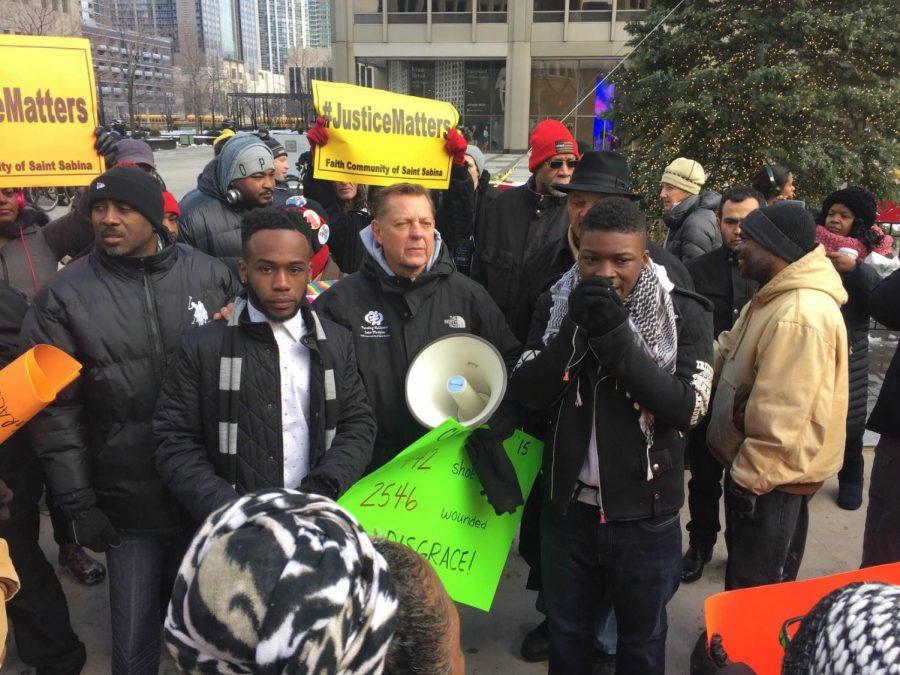Ordinance to target unlawful protests
Amirius Clinton (left), junior political science major, stands beside Father Michael Pfleger and other protestors during the Peace March on Dec. 31 in Chicago. Clinton said an unlawful assemblies ordinance by the City Council is in response to past student protests involving NIU students, such as Black Lives Matter protests and the Peace March.
January 25, 2016
Amirius Clinton, junior political science major, said the potential unlawful assemblies ordinance is a “slap in the face for law-abiding citizens.”
The draft ordinance, which DeKalb Mayor John Rey has pushed from today’s City Council agenda in an effort to hear the Student Association’s input, declares it to be a violation of city code for a person to fail to obey a command of a sworn peace officer or fail to disperse after a reasonable effort is made to advise the participants that the assembly is unlawful and must disperse, according to the draft ordinance in today’s City Council regular meeting agenda.
“I think it was a response to last year when students organized a protest for the Black Lives Matter movement and wanted their voices and stories against the DeKalb Police Department to be heard, and for our participation in the [Dec. 31 Peace March in Chicago],” Clinton said. “They don’t want us to bring that kind of energy here.”
The Black Lives Matter protest began on Dec. 5, 2014, in front of the DeKalb Police Department, 700 W. Lincoln Highway, and continued through the weekend culminating in an appearance at the Dec. 8, 2014 City Council meeting where protesters explained their motives as disapproval of the deaths of Michael Brown and Eric Garner. The number of demonstrators reached 85 through the weekend and 40 went to the City Council meeting, according to a Dec. 8, 2014 Northern Star article.
The Peace March in Chicago aimed to shine light on the lives that were lost in the African-American community in 2015, Clinton said.
“We just wanted to know they supported us as a community, just as people,” Clinton said. “We felt that they didn’t really care about it and that they wouldn’t care about it.”
The drafting of the ordinance took several months and drafters looked at events and responses locally and nationally and tried to set some expectations for the city, said DeKalb
City Attorney Dean Frieders.
“The ordinance certainly allows people to gather, it certainly allows people to exercise their First Amendment rights,” Frieders said. “When an assembly gets to a certain size and if certain unlawful behavior happens then an assembly could become unlawful.”
The ordinance lists 21 occurrences in which a 10-person or more assembly can become unlawful which include but is not limited to: assault, battery, criminal damage to property, unlawful use of alcohol, cannabis or a controlled substance and mob action.
“Our goal is preserving a safe environment for people to exercise their rights in,” Frieders said. “Our approach is very different. We want to engage the group, explain what is going on and give them a safe pass to disperse.”
The ordinance is not aimed at any specific group and is not in response to any singular event, Frieders said.
The first reading of the ordinance was Jan. 11 and it will be reviewed again at a future City Council meeting.







